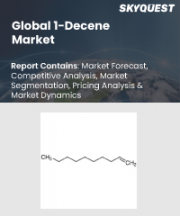
|
시장보고서
상품코드
1771376
옥소알코올 시장 수요, 예측 분석(2018-2034년)Global Oxo-Alcohols Market Demand & Forecast Analysis, 2018-2034 |
||||||
n-부탄올, 2-에틸헥산올(2-EH) 및 기타 동족체를 포함한 옥소알코올은 가소제, 아세트산 에스테르, 용매, 첨가제 등의 제조에 광범위하게 사용되는 화학제품군으로, 세계 옥소알코올 시장은 많은 최종 사용 산업에서 핵심 원료 공급원 역할을 하고 있습니다. 옥소알코올은 다재다능하고 비용 효율적이기 때문에 플라스틱, 코팅, 접착제, 자동차 부품, 퍼스널케어, 의약품, 건축자재 등의 생산에 없어서는 안 될 필수 요소로 자리 잡았습니다. 전 세계 산업 및 인프라 활동이 확대됨에 따라 도시화 및 소비자 선호도에 힘입어 전체 최종 용도 부문의 수요가 지속적으로 증가하고 있습니다.
수요 : 제품 유형별
n-부탄올은 용매 및 화학 중간체에서 균형 잡힌 성능을 발휘하기 때문에 여전히 가장 널리 사용되는 옥소알코올 중 하나입니다. 2-에틸헥산올(2-EH)은 가소제, 특히 디옥틸 프탈레이트(DOP)의 생산에 사용되는 주요 원료이며, 에스테르계 용제 및 윤활유 첨가제에도 사용되며, 가소제, 특히 디옥틸 프탈레이트(DOP)의 생산에 사용되는 주원료입니다. 에스테르계 용제 및 윤활유 첨가제에도 사용됩니다. 기타 옥소알코올(이소부탄올 및 그 동족체)은 특수 화학제품 및 세정제품과 같은 틈새시장에 공급됩니다.
수요 : 용도별
옥소알코올은 건설, 의료, 전선 및 케이블 용도의 PVC 및 기타 폴리머를 연화시키는 가소제로 사용됩니다. 아세트산 에스테르 용매로서 속건성 페인트, 코팅, 잉크를 가능하게 합니다. 산업용 용매로서 세정제, 접착제, 알코올 혼합물에 널리 사용됩니다. 윤활유 첨가제에서는 기계적 스트레스 및 고온에서의 성능을 향상시킵니다. 이 외에도 옥소알코올은 에스테르 유도체로서 향수, 로션과 같은 퍼스널케어 제품, 의약품의 활성 성분의 중간체 및 용매로서 의약품에 함유되어 있습니다.
최종 사용 산업 성과
플라스틱 및 고무에서는 파이프, 바닥재, 전선 절연재, 의료기기 등의 PVC 기반 재료가 수요를 촉진하고 있으며, n-부탄올과 2-EH는 여전히 중요한 구성요소입니다. 건설 분야에서는 고성능 솔루션에 사용되는 옥소알코올 기반 용매에 의존하는 코팅, 접착제, 실란트 등이 사용되고 있습니다. 자동차 산업에서 옥소알코올은 플라스틱 부품, 코팅, 오일, 특히 경량화된 자동차에 사용되는 플라스틱 부품, 코팅, 오일 생산에 도움이 됩니다. 제약 및 퍼스널케어는 순도와 규제 준수가 가장 중요하기 때문에 규모는 작지만 가치가 높은 분야입니다.
지역 수요 분석
아시아태평양은 중국, 일본, 한국, 인도, 동남아시아 등의 국가에서 활발한 PVC 및 가소제 생산으로 인해 세계 옥소알코올 시장을 독점하고 있습니다. 도시 개발과 자동차 산업의 성장으로 코팅, 용제, 플라스틱 포장에 대한 수요가 증가하고 있습니다. 북미와 유럽은 잘 확립된 산업 부문과 성숙한 규제로 인해 안정적인 수요를 유지하고 있습니다. 라틴아메리카는 인프라 투자와 연계되어 안정적인 수요 증가를 보이고 있습니다. 중동 및 아프리카는 현지 화학시설이 지역 공급망을 강화하면서 성장세를 보이고 있습니다.
주요 제조업체
옥소알코올 시장은 LG Chem, Evonik, BASF, Dow, ExxonMobil, SABIC, Eastman, Shell, Sasol, OXEA, PetroChina, Grupa Azoty, Sinopec, Mitsubishi Chemical 등의 주요 화학업체들이 독점하고 있습니다.
시장 역학
옥소알코올의 수요 증가는 플렉서블 PVC에서 산업용 용매에 이르기까지 인프라, 자동차, 포장 시장과 밀접하게 연관된 현대 소재에서 옥소알코올이 매우 중요한 역할을 하고 있기 때문입니다. 기술 개선은 수율을 개선하고 배출량을 줄이며, 지속가능성 목표에 부합합니다. 특히 유럽에서는 진화하는 제품 관리 및 가소제 규제가 제품 등급 요건(예: 프탈레이트 대체품 등)을 형성하고 있습니다. 원유 가격에 연동된 원자재 변동은 비용에 영향을 미칩니다. 시장 진입 기업들은 바이오 기반 알코올 및 그린 케미스트리에 대한 투자와 전통적인 석유화학 경로의 확장 사이에서 균형을 맞추고 있습니다. 물류 및 생산능력에 대한 투자는 지역 성장 시장에서 민첩하게 대응해야 할 필요성을 반영하고 있습니다.
세계의 옥소알코올 시장에 대해 조사 분석했으며, 시장 역학 및 산업 동향, 각 부문별 수요, 제조업체 프로파일 등의 정보를 전해드립니다.
목차
제1장 소개
제2장 시장 요약
- 시장의 진화
- 수요 개요
- 산업 구조
- 전략상 문제
- 최종 용도 동향
- 성장 예측
제3장 경제와 에너지 전망
- GDP와 인구통계
- 금융 정책과 재정 정책
- 원유 생산과 가격
- 천연가스
- 전기요금
제4장 최종 용도 부문 실적
- 플라스틱·고무
- 건설
- 자동차
- 의약품
- 퍼스널케어
- 기타
제5장 옥소알코올 소개와 시장 개요
- 제품 설명
- 등급과 특성
- 원재료
- 제조 공정
- 환경 문제
- 밸류체인
- 용도
제6장 시장 역학과 산업 동향
- 시장 역학
- 성장 촉진요인
- 성장 억제요인
- 기회
- 과제
제7장 세계의 옥소알코올 수요 분석 : 유형별, 용도별, 최종 이용 산업별(수량과 금액)(2018-2034년)
- 전략상 문제와 COVID-19의 영향
- 수요 분석과 예측(2018-2034년)
- 수요
- 수요 성장률
- 성장 촉진요인 분석
- 세계의 옥소알코올 시장 : 유형별
- n-부탄올
- 2-에틸헥산올(2-EH)
- 기타
- 세계의 옥소알코올 시장 : 용도별
- 가소제
- 아세트산 에스테르
- 용제
- 첨가제
- 기타
- 세계의 옥소알코올 시장 : 최종 이용 산업별
- 플라스틱·고무
- 건설
- 자동차
- 의약품
- 퍼스널케어
- 기타
제8장 수요 분석과 시장 리뷰 : 지역/국가별(수량과 금액)(2018-2034년)
- 전략상 문제와 COVID-19의 영향
- 수요 분석과 예측(2018-2034년)
- 수요
- 수요 성장률
- 옥소알코올 시장 : 유형별
- 옥소알코올 시장 : 용도별
- 옥소알코올 시장 : 최종 이용 산업별
- 북미
- 미국
- 캐나다
- 멕시코
- 서유럽
- 독일
- 프랑스
- 이탈리아
- 영국
- 스페인
- 기타 서유럽
- 중유럽 및 동유럽
- 러시아
- 폴란드
- 기타 중유럽 및 동유럽
- 아시아태평양
- 중국
- 일본
- 인도
- 한국
- 기타 아시아태평양
- 중남미
- 중동 및 아프리카
제9장 가격 분석
제10장 주요 전략상 문제와 사업 기회 평가
- 시장 매력 평가
- 전망과 표적 시장 조사
제11장 전략적 추천과 제안
제12장 기업 분석
- 옥소알코올 제조업체 개요/기업 분석
- 기본 상세
- 본사, 주요 시장
- 소유
- 기업 재무
- 제조 거점
- 세계 매출
- 총 직원수
- 제품 포트폴리오/서비스/솔루션
- 채용된 주요 사업 전략과 Prismane Consulting 개요
- 최근 발전
- 대상 기업
- LG Chem
- Evonik
- BASF
- ExxonMobil
- SABIC
- Eastman Chemical Company
- Shell
- Sasol
- OXEA
- PetroChina
- Grupa Azoty
- Sinopec
- Mitsubishi Chemical Corporation
- 기타 제조업체
제13장 부록
ksm 25.07.24The global oxo alcohols market serves as a backbone raw material source for many end use industries. This chemical family including n butanol, 2 ethylhexanol (2 EH), and other homologues is used extensively in the manufacturing of plasticizers, acetate esters, solvents, additives, and more. Its versatility and cost effectiveness have made oxo alcohols indispensable in the production of plastics, coatings, adhesives, automotive components, personal care, pharmaceuticals, and construction materials. As global industrial and infrastructure activity expands, demand across end use sectors continues to grow, driven by urbanization, and consumer preferences.
Demand by Product Type
N butanol remains one of the most widely used oxo alcohols, prized for its balanced performance in solvents and chemical intermediates. It plays a vital role production of products such as butyl acrylate, cellulose acetate, and n butyl acetate which are critical in application incusing paints& coating, inks, and adhesives. 2 Ethylhexanol (2 EH) is a dominant feedstock for plasticizer production, particularly dioctyl phthalate (DOP), and is also used in ester-based solvents and lubricant additives. Other oxo alcohols, like iso butanol and higher homologues, serve niche markets in specialty chemicals and cleansing products.
Demand by Application
Oxo alcohols find use in plasticizers to soften PVC and other polymers for construction, medical, and wire and cable applications. As acetate ester solvents, they enable fast-drying paints, coatings, and inks. They are widely used as industrial-grade solvents in cleaning agents, adhesives, and alcohol blends. In lubricant additives, they enhance performance under mechanical stress and high temperatures. Beyond these, oxo alcohols are included in personal care products such as fragrances and lotions for their ester derivatives, and in pharmaceuticals as intermediates or solvents for active ingredients.
End Use Industry Performance
In plastics and rubber, demand is driven by PVC-based materials in pipes, flooring, wire insulation, and medical devices. N Butanol and 2 EH remain key building blocks. Construction uses coatings, adhesives and sealants that rely on oxo alcohol-based solvents for high-performance solutions. In automotive, oxo alcohols help produce plastic components, coatings, and oils, especially in lightweight vehicles. Pharmaceuticals and personal care account for a smaller but high-value market segment, where purity and regulatory compliance are paramount.
Regional Demand Analysis
Asia Pacific dominated the global oxo alcohol market driven by strong PVC and plasticizer production in countries such as China, Japan, South Korea, India and Southeast Asia. Urban development and auto industry growth fuel regional demand for coatings, solvents, and plastic packaging. North America and Europe maintain stable demand due to established industrial sectors and mature regulations. Latin America shows steady demand growth allied with infrastructure investments. The Middle East and Africa are gaining traction, as local chemical facilities boost regional supply chains.
Key Manufacturers
The oxo alcohols market is dominated by major chemical producers such as LG Chem, Evonik, BASF, Dow, ExxonMobil, SABIC, Eastman, Shell, Sasol, OXEA, PetroChina, Grupa Azoty, Sinopec, and Mitsubishi Chemical.
Market Dynamics
Growth in oxo alcohol demand is driven by products' pivotal role in modern materials from flexible PVC to industrial solvents tied closely to infrastructure, automotive, and packaging markets. Technology improvements enhance yield and reduce emissions, aligning with sustainability targets. Evolving product stewardship and plasticizer regulations, particularly in Europe, shape product grade requirements (e.g., phthalate replacements). Fluctuations in raw materials that are linked to crude-oil pricing impact costs. Market players are balancing investments in bio-derived alcohols and green chemistry with scaling traditional petrochemical routes. Logistics and capacity investments also reflect the need to stay agile in regional growth markets.
Table of Contents
1. Introduction
- Scope
- Market Coverage
- Types
- Applications
- End-Use Industries
- Regions
- Countries
- Years Considered
- Historical - 2018 - 2023
- Base - 2024
- Forecast Period - 2025 - 2034
- Research Methodology
- Approach
- Research Methodology
- Prismane Consulting Market Models
- Assumptions & Limitations
- Abbreviations & Definitions
- Conversion Factors
- Data Sources
2. Market Synopsis
- Market Evolution
- Demand Overview
- Industry Structure
- Strategic Issues
- End-use Trends
- Growth Forecast
3. Economic & Energy Outlook
- GDP and Demographics
- Monetary & Fiscal Policies
- Crude Oil Production and prices
- Natural Gas
- Electricity Prices
4. End-use Sector Performance
- Plastics & Rubber
- Construction
- Automotive
- Pharmaceuticals
- Personal Care
- Others
5. Introduction to Oxo-Alcohols and Market Overview
- Product Description
- Grades & Properties
- Raw Material
- Manufacturing Process
- Environmental Issues
- Value Chain
- Applications
6. Market Dynamics and Industry Trends
- Market Dynamics
- Drivers
- Restraints
- Opportunities
- Challenges
7. Global Oxo-Alcohols Demand Analysis, By Types, By Applications, By End-Use Industries (Volume, Value) (2018-2034)
- Strategic Issues and COVID-19 Impact
- Demand Analysis and Forecast (2018- 2034)
- Demand
- Demand Growth Rate (%)
- Driving Force Analysis
- Global Oxo-Alcohols Market, By Types
- N-Butanol
- 2-Ethylhexanol (2EH)
- Others
- Global Oxo-Alcohols Market, By Applications
- Plasticizers
- Acetate Esters
- Solvent
- Additive
- Others
- Global Oxo-Alcohols Market, By End-Use Industries
- Plastics & Rubber
- Construction
- Automotive
- Pharmaceuticals
- Personal Care
- Others
8. Demand Analysis and Market Review, By Region, By Country (Volume, Value), (2018- 2034)
- Strategic Issues and COVID-19 Impact
- Demand Analysis and Forecast (2018- 2034)
- Demand
- Demand Growth Rate (%)
- Oxo-Alcohols Market, By Types
- Oxo-Alcohols Market, By Applications
- Oxo-Alcohols Market, By End-Use Industries
Note: Demand Analysis has been provided for all major Regions / Countries as mentioned below. The demand (consumption) split by types, applications, and end-use industries has been provided for each of the countries / regions in Volume (Kilo tons) and Value (USD Million).
- North America
- USA
- Canada
- Mexico
- Western Europe
- Germany
- France
- Italy
- United Kingdom
- Spain
- Rest of Western Europe
- Central & Eastern Europe
- Russia
- Poland
- Rest of Central & Eastern Europe
- Asia-Pacific
- China
- Japan
- India
- South Korea
- Rest of Asia-Pacific
- Central & South America
- Middle East & Africa
Note: CAGR will be calculated for all types, applications and end-use industries to arrive at the regional / global demand growth for the forecast period (2025 - 2034)
9. Pricing Analysis
10. Key Strategic Issues and Business Opportunity Assessment
- Market Attractiveness Assessment
- Prospective & Target Market Study
11. Strategic Recommendation & Suggestions
12. Company Analysis
- Oxo-Alcohols Manufacturers Profiles/ Company Analysis
- Basic Details
- Headquarter, Key Markets
- Ownership
- Company Financial
- Manufacturing Bases
- Global Turnover
- Total Employee
- Product Portfolio / Services / Solutions
- Key Business Strategies adopted and Prismane Consulting Overview
- Recent Developments
- Companies Covered -
- LG Chem
- Evonik
- BASF
- ExxonMobil
- SABIC
- Eastman Chemical Company
- Shell
- Sasol
- OXEA
- PetroChina
- Grupa Azoty
- Sinopec
- Mitsubishi Chemical Corporation
- Other Manufacturers
Note: This section includes company information, company financials, manufacturing bases and operating regions. Company financials have been mentioned only for those companies where financials were available in SEC Filings, annual reports, or company websites. All the reported financials in this report are in U.S. Dollars. Financials reported in other currencies have been converted using average currency conversion rates. Company profiles may include manufacturers, suppliers, and distributors.
13. Appendices
- Demand - Regions
- Demand - Countries















